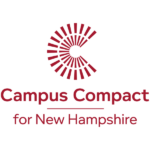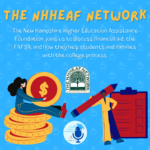Related Content

Events
Rural Conversations

Navigate: A Road Map for New Hampshire S

Podcasts
Dorm Sweet Dorm

Podcasts
Solidly Scholarly

Podcasts
Legally Speaking

Podcasts
The NHHEAF Network

Podcasts
Hairs to You

Podcasts
Admissions Advice

Podcasts
United We Serve

Podcasts
Talking TRIO
Community Colleges for Democracy: Aligning Civic and Community Engagement with Institutional Priorities
This publication from Campus Compact presents a set of contemporary case studies examining how civic engagement and learning at community colleges can be leveraged to advance institutional effectiveness, college completion, and student success. Edited by Verdis L. Robinson and Clayton A. Hurd, this book is available from Campus Compact as a download or in hard copy. Community colleges, as local institutions, are an essential part of the American landscape of higher education, playing key roles to democratize it and to provide more people access to upward mobility. At the same time, community colleges are especially well positioned to provide benefits for the larger…
Anti-Racist Community-Engaged Learning
Campus Compact has made available video recordings from a virtual symposium, “Anti-Racist Community-Engaged Learning: Principles, Practices, and Pedagogy.” Held in February 2022, the symposium explored topics such as principles of anti-racist pedagogy, voices from the field, and creating an anti-racist community of practice. The symposium was sponsored by Campus Compact, the Massachusetts Department of Higher Education, Salem State University, Worcester State University, Fitchburg State University, and the University of Massachusetts Amherst. View the recorded sessions.
Building Local Capacity
One of the biggest challenges for universities seeking to be effective community partners is to identify partners and help those partners increase their own economic development capacity. This Knowledge Hub from Campus Compact contains links to resources on best practices, and models for effective, sustainable partnerships.
The Role of Libraries in Engagement Work
This Knowledge Hub from Campus Compact provides a compilation of examples showing the myriad ways that libraries can help deepen community relationships and further the ongoing engagement efforts of college and university campuses.
Glossary of Campus Engagement Terms
Below you will find definitions to help understand and educate professionals interested in service-learning, civic engagement and the scholarship of engagement. What is Service-Learning? Service-learning means a method under which students learn and develop through thoughtfully organized service that: is conducted in and meets the needs of a community and is coordinated with an institution of higher education and with the community; helps foster civic responsibility; is integrated into and enhances the academic curriculum of the students enrolled; and includes structured time for students to reflect on the service experience. American Association for Higher Education (AAHE): Series on Service-Learning in…
Inclusive Excellence Toolkit
This toolkit assembles resources from a statewide symposium, Project Inclusion New Hampshire: Assessing and Enacting a Commitment to Diversity, Inclusion, and Equity on Campus. The symposium, held in June 2016, explored strategies for making higher education more inclusive in ways that benefit all members of the campus community. Project Inclusion was made possible through support from the Lloyd G. Balfour Foundation, Bank of America, N. A., Trustee. Documentation of the materials found on this page was made possible through the generous support of the New Hampshire Endowment for Health.
Institutional Assessment
To plan for future action, it’s important to understand your starting point. This entails a self-assessment of engagement across a variety to indicators, putting tracking and monitoring into place, and utilizing national data and trends to inform future practice. An institutional self-assessment will include a comprehensive examination of the following themes and best practices of an engaged campus: institutional culture, curriculum and pedagogy, faculty roles and rewards, mechanisms and resources, and community-campus exchange. One of a wide range of Knowledge Hubs developed by Campus Compact, Institutional Assessment offers a variety of resources to support self-assessment, tracking and monitoring, and the…
Peter Levine on the Future of Civic Education
In this episode, Andrew Seligsohn, president of Campus Compact, reflects on the outcome of the election and discusses the future of civic engagement among young people with Peter Levine, Associate Dean of Academic Affairs and Lincoln Filene Professor of Citizenship & Public Affairs in Tufts University’s Jonathan Tisch College of Civic Life.
Civic Action Plans
Campus Compact’s Civic Action Plan Library offers plans submitted by member campuses across the country to further the public purposes of higher education. These plans set out a path for maximizing the impact of community engagement on students and communities. In addition to models from a range of institutional types, this library provides resources for planning, developing, publicizing, and assessing civic action plans. You’ll also find a portal for submitting your own plan.
Community Partnerships
One of a wide range of Knowledge Hubs from Campus Compact, Community Partnerships offers useful resources and readings to help campuses forge effective partnerships. Resources include suggested readings on campus-community partnerships and asset-based community development, sample Memorandums of Understanding (MOUs), and useful web resources.
Strengthening 2- to 4-Year Transfer Pathways
Building coherent, smooth, and clear 2-year to 4-year transfer pathways can impact student access, persistence, and success. Transfer student success pulls on several areas of the institution including admissions, student support, housing, faculty, advising, and more. A comprehensive approach to creating transfer pathways and articulation agreements that incorporate staff, faculty, and administrators from both the 2-year and 4-year institutions is essential. One of a wide range of knowledge hubs developed by Campus Compact, Strengthening 2- to 4-Year Transfer Pathways offers resources, models, and information from across the country.
Supporting Retention through Food and Housing Security
While civic engagement traditionally looks at the issue of hunger outside of the institution, these initiatives can look inward to the campus community to support work addressing issues of campus food and housing insecurity. These issues can have a major impact on student retention and success. Community and civic engagement offices can work to align themselves with on-campus efforts to support at-risk students and the wider community of the campus. These efforts include raising awareness of the challenges many college students face regarding food and housing insecurity and working to address those issues. One of a wide range of Knowledge…
Carnegie Community Engagement Classification
The Carnegie Foundation’s Elective Classification for Community Engagement provides a special-purpose classification for higher education institutions with commitments in the area of community engagement. The classification framework represents best practices in the field and encourages continuous improvement through periodic re-classification. It offers a way for campuses to evaluate, strengthen, and promote their community engagement efforts. Find more information on the national Campus Compact website.
Creating a Service Year on Campus
The incorporation of a year of service into the post-secondary education experience helps prepare students to complete their degrees, secure meaningful employment, and become lifelong engaged citizens. Service years in higher education have the power to attract students, enliven education, and put graduates on pathways to careers. This knowledge hub provides resources for campus stakeholders interested in supporting alumni of service year programs on their campus, creating a service year connected to academic credit, or providing opportunities for faculty and staff to support service initiatives. One of a wide range of knowledge hubs developed by Campus Compact, Creating a Service…
Building Interfaith Cooperation through Civic Engagement
Religious and ethical convictions are a driving force behind people’s motivation to serve others. Ignoring these convictions misses a valuable opportunity to connect values to action. As America continues to diversify, opportunities for conflict around religious difference abound. However, there is also ample opportunity for students to engage in cooperative and healthy ways by exploring the shared values between traditions–– specifically through service to their communities. This knowledge hub provides resources for civic engagement and service-learning professionals interested in fostering opportunities for students to engage their religious, spiritual, and secular values in their service work. One of ten knowledge hubs…
Applying STEM to Real-World Issues through Service-Learning
Students in the United States are often found to underperform academically in science, technology, engineering, and math (STEM). As a result, they are not choosing to pursue careers in STEM fields at a rate needed to meet expected demand in the labor market–thus creating a skills gap. One way to address the STEM skills gap is for higher education to work with K-12 schools to get children more interested in STEM fields by linking STEM learning to real-world issues. This approach can also help struggling students perform better in STEM areas. This will, in turn, create better-performing students who are…
Building K–12/Higher Education Partnerships
K–12 / higher education partnerships are perhaps the most pervasive form of community partnerships in higher education. In the early 1900s, for example, educational philosopher John Dewey created laboratory schools at the University of Chicago as a place for pre-service teachers to learn teaching by actually doing it. For many years, universities have placed pre-service teachers in classrooms across the United States. A call for increased university involvement grew out of the concerns raised by the A Nation at Risk report (National Commission on Excellence in Education, 1983) and the subsequent Holmes Group Report (1986), which specifically called attention to…
Increasing Student Political Participation
While many parts of fostering civic engagement in a campus environment are hard to measure, the rate of student voter registration and student voting are two very easy variables to quantify, and are in fact publicly available data if you know where to look. And of course, if you’re not registered, you can’t vote. Different inputs that affect the rate student voting at a given institution highlighted in this guide are more complicated, and will vary substantially from campus to campus depending on the student population type. To increase the rate of student voter registration and student voting on your…
Building Deep and Sustainable Connections among Sport, Academics, and Community
Most colleges and universities believe athletics to be a critical part of the academic experience. Sport programs enhance the college’s reputation and teach student athletes important life lessons about perseverance, cooperation, and leadership that complement the academic mission. However, the significant demands of sport can isolate athletes from the larger student population and contribute to a disparaging stereotype of athletes as less engaged in the life of the university and in the community. The response of many colleges and universities is to develop separate service initiatives for athletes. However, these service programs tend to place more demands on the limited…
Assessment of Students’ Civic Learning and Development
One vital responsibility of higher education institutions is to prepare students for lives of engaged citizenship, with the motivation and capacity to deliberate, act, and lead in pursuit of the public good. Being able to measure and share the outcomes your students achieve due (in part) to the community engagement activities they participated in through your institution is something we hope all of our partner institutions aspire to accomplish. We are all familiar with the adage that students receiving a degree should learn something and develop into prepared graduates—typically focused on learning and preparation for the workforce or a career….
 -->
-->
